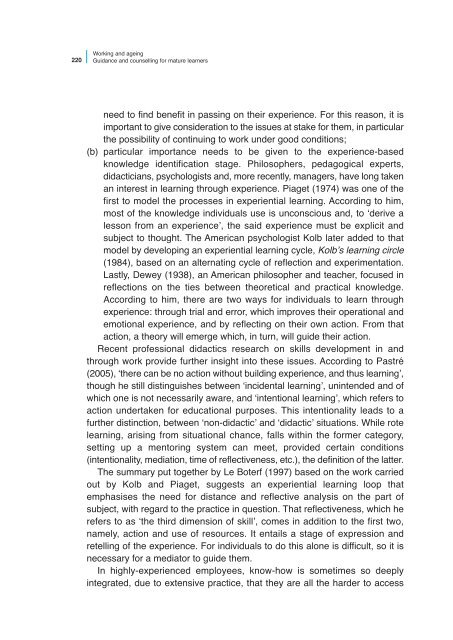Working and ageing - Cedefop - Europa
Working and ageing - Cedefop - Europa
Working and ageing - Cedefop - Europa
You also want an ePaper? Increase the reach of your titles
YUMPU automatically turns print PDFs into web optimized ePapers that Google loves.
220<br />
<strong>Working</strong> <strong>and</strong> <strong>ageing</strong><br />
Guidance <strong>and</strong> counselling for mature learners<br />
need to find benefit in passing on their experience. For this reason, it is<br />
important to give consideration to the issues at stake for them, in particular<br />
the possibility of continuing to work under good conditions;<br />
(b) particular importance needs to be given to the experience-based<br />
knowledge identification stage. Philosophers, pedagogical experts,<br />
didacticians, psychologists <strong>and</strong>, more recently, managers, have long taken<br />
an interest in learning through experience. Piaget (1974) was one of the<br />
first to model the processes in experiential learning. According to him,<br />
most of the knowledge individuals use is unconscious <strong>and</strong>, to ʻderive a<br />
lesson from an experienceʼ, the said experience must be explicit <strong>and</strong><br />
subject to thought. The American psychologist Kolb later added to that<br />
model by developing an experiential learning cycle, Kolbʼs learning circle<br />
(1984), based on an alternating cycle of reflection <strong>and</strong> experimentation.<br />
Lastly, Dewey (1938), an American philosopher <strong>and</strong> teacher, focused in<br />
reflections on the ties between theoretical <strong>and</strong> practical knowledge.<br />
According to him, there are two ways for individuals to learn through<br />
experience: through trial <strong>and</strong> error, which improves their operational <strong>and</strong><br />
emotional experience, <strong>and</strong> by reflecting on their own action. From that<br />
action, a theory will emerge which, in turn, will guide their action.<br />
Recent professional didactics research on skills development in <strong>and</strong><br />
through work provide further insight into these issues. According to Pastré<br />
(2005), ʻthere can be no action without building experience, <strong>and</strong> thus learningʼ,<br />
though he still distinguishes between ʻincidental learningʼ, unintended <strong>and</strong> of<br />
which one is not necessarily aware, <strong>and</strong> ʻintentional learningʼ, which refers to<br />
action undertaken for educational purposes. This intentionality leads to a<br />
further distinction, between ʻnon-didacticʼ <strong>and</strong> ʻdidacticʼ situations. While rote<br />
learning, arising from situational chance, falls within the former category,<br />
setting up a mentoring system can meet, provided certain conditions<br />
(intentionality, mediation, time of reflectiveness, etc.), the definition of the latter.<br />
The summary put together by Le Boterf (1997) based on the work carried<br />
out by Kolb <strong>and</strong> Piaget, suggests an experiential learning loop that<br />
emphasises the need for distance <strong>and</strong> reflective analysis on the part of<br />
subject, with regard to the practice in question. That reflectiveness, which he<br />
refers to as ʻthe third dimension of skillʼ, comes in addition to the first two,<br />
namely, action <strong>and</strong> use of resources. It entails a stage of expression <strong>and</strong><br />
retelling of the experience. For individuals to do this alone is difficult, so it is<br />
necessary for a mediator to guide them.<br />
In highly-experienced employees, know-how is sometimes so deeply<br />
integrated, due to extensive practice, that they are all the harder to access

















